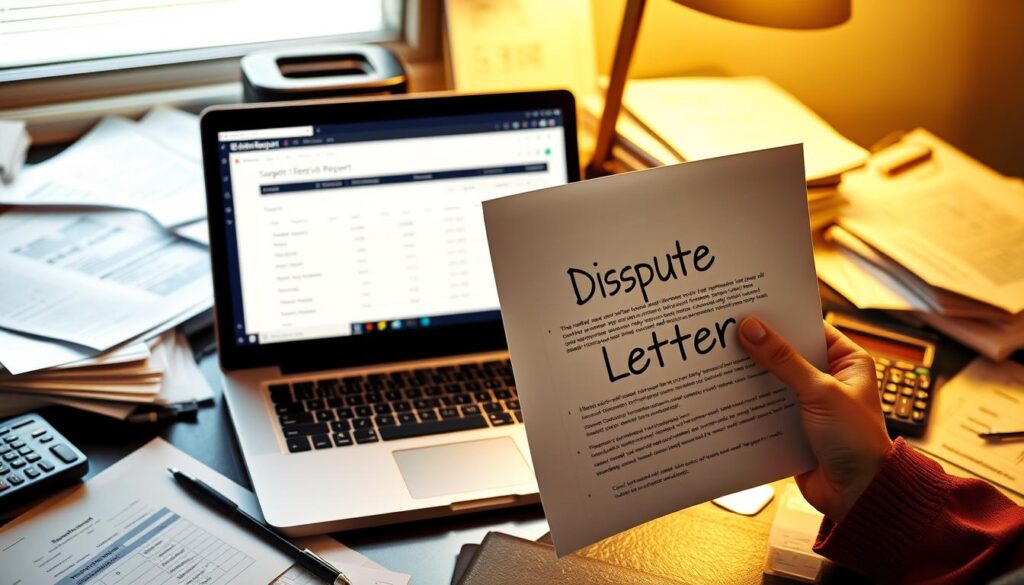Keeping your credit report accurate is vital for your financial health. An old address can affect your ability to get loans or jobs. It’s important to act quickly to remove outdated information.
This guide offers a sample letter to remove an old address from your credit report. We’ll walk you through the steps to dispute and update incorrect information. You’ll learn how to take charge of your credit history.
Key Takeaways
- Understand the importance of maintaining an accurate credit report and addressing inaccuracies
- Learn how to identify and dispute common credit report errors, including outdated address information
- Discover your rights under the Fair Credit Reporting Act and the steps to correct inaccurate information
- Gain insights on effectively writing and submitting a dispute letter to the credit bureaus
- Explore the options for following up on your dispute and ensuring your credit report remains accurate
Understanding Credit Report Inaccuracies
Your credit report can greatly impact your financial life. It affects your ability to get loans, credit cards, and even jobs. Errors in these reports, like wrong addresses, can harm your credit score. It’s crucial to fix address discrepancy on credit report and other credit report mistakes.
Common Credit Report Errors
Some of the most common credit report errors include:
- Incorrect or outdated personal information, such as name, address, or date of birth
- Accounts that do not belong to you, often due to identity theft or mix-ups with another person’s information
- Incorrect account balances, payment histories, or credit limits
- Duplicate accounts or information
- Accounts that should have been removed due to the statute of limitations or successful credit report dispute letter
Consequences of Incorrect Information
Inaccuracies on your credit report can have far-reaching consequences, including:
- Decreased credit score: Negative information, even if incorrect, can drag down your credit score, making it harder to obtain credit, loans, or even secure employment.
- Difficulty obtaining credit: Lenders may be hesitant to approve your applications if your credit report contains inaccurate information or errors.
- Higher interest rates: Inaccuracies that result in a lower credit score can lead to higher interest rates on loans and credit cards, costing you more money over time.
- Denial of housing or employment: Some landlords and employers may use credit reports to make decisions, and inaccuracies could lead to being denied or overlooked.
Wrong info on your credit report can cause many problems. It can lower your credit score and make getting loans harder. You might also face higher interest rates or job denials.
Fixing these mistakes is key to a healthy financial future. It ensures you get the credit and chances you deserve. Don’t let errors hold you back.
The Importance of Correcting Your Credit Report
An accurate credit report is vital for your financial health. Wrong info can lead to loan denials and higher interest rates. It can even affect renting or getting a job.
By correcting any errors, you can boost your credit score. This opens doors to better financial chances. It also protects your money matters.
Fixing credit report mistakes updates your credit history. It ensures lenders have correct info about your finances. Errors can stem from identity theft or outdated data.
Addressing these issues impacts your ability to get credit. It helps secure good loan terms. It also maintains a healthy money profile.
We’ll explore steps to fix credit report errors. You’ll learn how to make your report reflect your true financial history. Taking charge of your credit report can open new money doors.

“Maintaining an accurate credit report is the key to unlocking financial success.”
Rights Under the Fair Credit Reporting Act
The Fair Credit Reporting Act (FCRA) protects consumers’ credit reports. It gives you important rights for managing your credit information. Knowing these rights helps you fix mistakes on your credit report.
Consumer Protection Laws
The FCRA lets you get free credit reports once a year. This helps you check your credit info and spot any mistakes.
Credit bureaus must fix errors on your report quickly. This stops wrong data from hurting your credit score unfairly.
Disputing Inaccurate Credit Report Information
Found inaccurate information on your report? The FCRA lets you dispute it with credit bureaus. They must look into your claim and fix mistakes quickly.
- The credit bureaus must investigate the dispute and respond within 30-45 days.
- If the investigation finds the information is inaccurate, the credit bureau must remove or correct the item on your credit report.
- You have the right to request a free copy of your credit report after the dispute is resolved.
Using your FCRA rights keeps your credit report accurate. It ensures fair evaluation of your creditworthiness. Stay on top of your credit info to protect your financial future.
Preparing to Write the Dispute Letter
Gather all relevant documents before drafting your credit report dispute letter. This preparation will help you present a strong case to credit bureaus. Your goal is to remove an old address from your credit report.
Gathering Supporting Documentation
Get copies of your credit report from Experian, Equifax, and TransUnion. Review these reports to find the old address you want to remove from your credit report.
Collect any past correspondence with credit bureaus about correcting credit report mistakes. This includes letters, emails, or records of attempts to remove inaccurate information from your file.
- Obtain copies of your most recent credit reports from Experian, Equifax, and TransUnion.
- Gather any previous communications with the credit bureaus about the inaccurate information.
- Collect any other supporting documentation that can help substantiate your claim, such as utility bills, bank statements, or identification documents.
Strong preparation will improve your chances of success. With the right documents, you can effectively dispute the credit report. This will help you remove the old address from your credit file.
“Careful preparation is the key to a successful credit report dispute. Gather all the necessary evidence to support your claim and present a compelling case to the credit bureaus.”
Writing an Effective Dispute Letter
A persuasive dispute letter is vital for fixing credit report errors. Your letter should clearly outline the mistakes you want to address. This approach increases your chances of success.
Key Elements of the Letter
Include these important components in your dispute letter:
- Identification: Provide your full name, current address, and other personal details for identification.
- Explanation of the Error: Clearly describe the incorrect information on your credit report.
- Supporting Documentation: Include relevant documents that support your claim, like utility bills or lease agreements.
- Requested Action: State the action you want the credit bureau to take, such as removing the inaccurate address from my credit report.
- Contact Information: Add your phone number, email address, and other contact details for follow-ups.
Present your case clearly and compellingly to increase chances of a favorable outcome. This approach can help remove an old address from your credit report.
A well-structured letter improves your odds of success with credit bureaus. It’s a crucial step in maintaining accurate financial records.
“Correcting credit report mistakes is essential for maintaining a healthy financial profile and achieving your long-term goals.”
sample letter to remove old address from credit report pdf
An accurate credit report is vital for your financial health. Old addresses on your report can cause issues. Our sample letter helps you dispute this information with credit bureaus.
The template below covers key details for writing to credit bureaus. It includes steps to request old address removal. Feel free to customize it for your situation.
Fixing errors on your credit report can boost your financial health. It may also improve your credit score. Use this sample letter to update your address information accurately.
| Credit Bureau | Address | Phone Number | Website |
|---|---|---|---|
| Experian | PO Box 4500, Allen, TX 75013 | 1-888-397-3742 | www.experian.com |
| Equifax | PO Box 740256, Atlanta, GA 30374 | 1-800-685-1111 | www.equifax.com |
| TransUnion | PO Box 2000, Chester, PA 19016 | 1-800-916-8800 | www.transunion.com |

This sample letter helps you manage your credit report effectively. It ensures your address information is up-to-date. Take action now to maintain your financial wellbeing.
Addressing the Letter Properly
Sending a credit report dispute letter? Address it correctly to reach the right department. Each major credit bureau has a specific mailing address for handling disputes.
Contact Information for Credit Bureaus
Use the following contact information for each credit bureau:
- Experian: Experian, P.O. Box 4500, Allen, TX 75013
- Equifax: Equifax Information Services LLC, P.O. Box 740256, Atlanta, GA 30374-0256
- TransUnion: TransUnion LLC, P.O. Box 2000, Chester, PA 19016-2000
Using the correct address and format helps your dispute get processed efficiently. This can lead to faster resolution of credit report inaccuracies.
“Addressing your credit report dispute letter correctly is the first step in getting inaccuracies corrected.”
Proper addressing is key to navigating the credit reporting system. It’s an important step in protecting your financial well-being.
Sending the Dispute Letter
Fixing credit report errors starts with a detailed dispute letter. Gather all needed documents to support your case. Follow the right steps to track your dispute’s progress.
Send your letter via certified mail with return receipt. This proves the credit bureaus got your message. It also shows when they received it, setting a clear timeline for their response.
- Package your dispute letter and supporting docs carefully.
- Address the envelope to the right credit bureau(s).
- Send it via certified mail with return receipt.
- Keep the receipt as proof of delivery.
These steps ensure proper handling of your dispute letter. They set the stage for fixing any credit report mistakes you’ve found.
“Protecting your credit is a vital part of maintaining financial health. Sending your dispute letter properly is the first step in reclaiming the accuracy of your credit report.”

Following Up on Your Dispute
After sending your credit report dispute letter, stay on top of your case. The credit bureaus have a set time to investigate and respond. This timeline is key to the process.
Timeline for Credit Bureau Response
The Fair Credit Reporting Act (FCRA) sets rules for credit bureaus. They must respond to disputes within 30 days. Sometimes, they may need 45 days if more info is needed.
If you don’t hear back in time, follow up quickly. Correcting credit report mistakes can greatly affect your finances. Make sure things are moving as they should.
- Check the status of your dispute by contacting the credit bureau directly.
- Politely inquire about the progress of the investigation and request an estimated timeline for a resolution.
- If the credit bureau fails to respond or resolve the issue within the specified timeframe, consider escalating the matter by filing a complaint with the Consumer Financial Protection Bureau (CFPB).
Keep an eye on your credit report dispute letter process. Follow up when needed. This can help you get better results and fix your credit report.
Handling Persistent Credit Report Errors
Persistent credit report errors can be frustrating. You have options to update your credit file accurately. Even after disputing, credit bureaus may not investigate or correct inaccurate information.
File complaints with regulatory agencies like the Consumer Financial Protection Bureau (CFPB). These agencies can investigate and work with credit bureaus to resolve issues.
Seek help from consumer advocacy organizations. They offer guidance and resources. Sometimes, they provide legal representation to help remove inaccurate information.
Be persistent and document everything. Keep records of communications, supporting documents, and responses. This evidence is crucial for escalating your case.
“Persistence is key when dealing with credit report errors. Don’t let the credit bureaus dismiss your concerns – keep pushing until the inaccuracies are corrected.”
You have the right to accurate credit reporting. Exercise this right to maintain a healthy credit profile. Take steps to address errors and protect your financial well-being.

Maintaining Accurate Credit Reports
Keeping your credit report accurate is vital for your financial health. Regular monitoring helps spot discrepancies that could harm your credit history. It allows you to correct credit report mistakes or fix credit report errors promptly.
Monitoring Your Credit
Reviewing your credit report is key to a strong credit profile. Here are tips to help you monitor your credit effectively:
- Request a free copy of your credit report from each of the three major credit bureaus (Experian, Equifax, and TransUnion) at least once a year.
- Carefully examine your credit report for any inaccuracies, such as incorrect account information, erroneous payment history, or unauthorized inquiries.
- Set up credit monitoring alerts to receive notifications about any changes or suspicious activity on your credit report.
- Dispute any errors or discrepancies promptly with the credit bureaus to ensure the information on your report is accurate and up-to-date.
Taking action to update your credit history helps maintain a strong credit profile. It also protects your long-term financial well-being.
Correcting credit report mistakes is crucial for your financial health. It ensures your report accurately reflects your financial standing.
| Importance of Monitoring Your Credit | Benefits of Maintaining Accurate Credit Reports |
|---|---|
|
|
Stay alert and address credit report errors quickly. This ensures your report accurately shows your financial history. It helps build a solid credit foundation for your future.
Working with Credit Repair Services
Struggling to fix credit report errors? A reputable credit repair service can help. These experts offer guidance and resources to navigate the credit reporting process effectively.
Fixing credit report errors becomes easier with professional help. Credit repair services can spot inaccuracies, draft dispute letters, and follow up with credit bureaus.
These services know consumer protection laws inside out. They understand the credit reporting system and can protect your rights throughout the process.
Credit repair services have special tools to speed up repairs. They may find hidden errors on your report and create strategies to address them.
Professional help comes at a cost. However, the benefits often outweigh the fee, especially for complex credit issues.
Choose a credit repair service carefully. Check their reputation, success rates, and customer reviews. Ensure they’re transparent about fees and comply with all laws.
“Working with a reputable credit repair service can be a game-changer in your efforts to fix credit report errors and achieve the credit score you deserve.”
Protecting Your Credit and Identity
Your credit report’s accuracy is vital for financial health and identity protection. Stay alert to suspicious activity. Take proactive steps to guard against identity theft.
Identity Theft Prevention Tips
Regularly check your credit reports from Experian, Equifax, and TransUnion. Look for any address discrepancies or mistakes. This helps you spot and fix unauthorized activities quickly.
Be careful when sharing personal information like your Social Security number. Only use trusted channels for sensitive details. Avoid responding to unsolicited requests for this data.
By protecting your personal information, you lower the risk of identity theft. This helps safeguard your credit and financial well-being.

